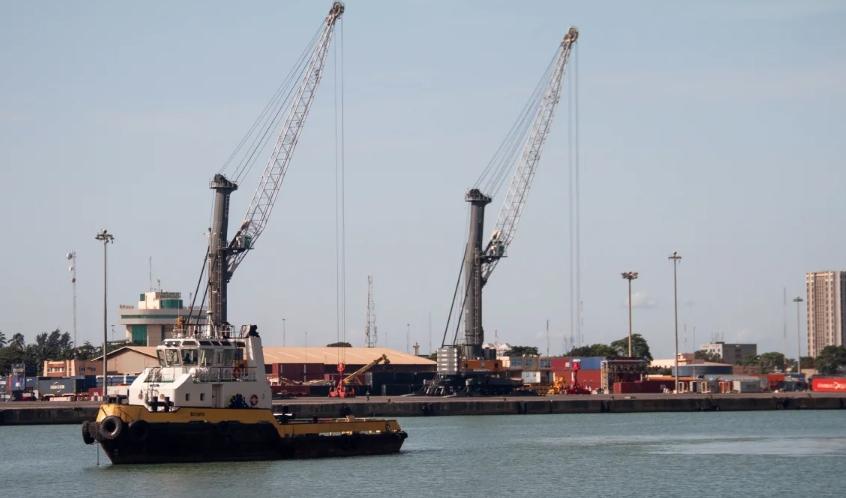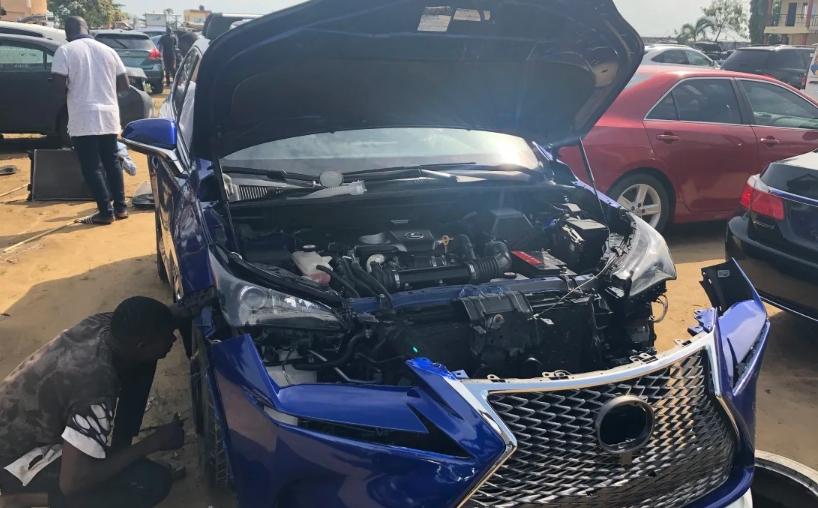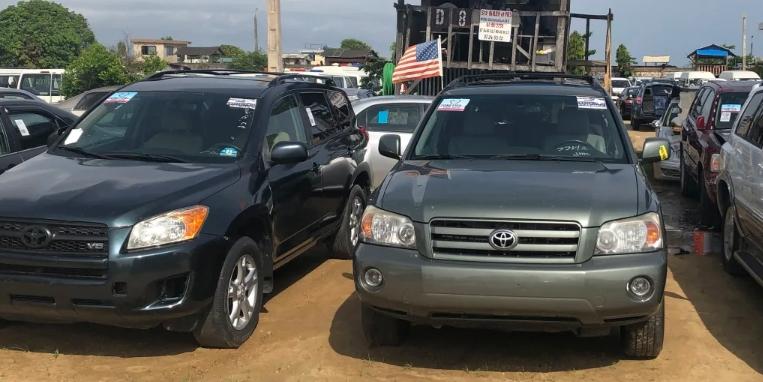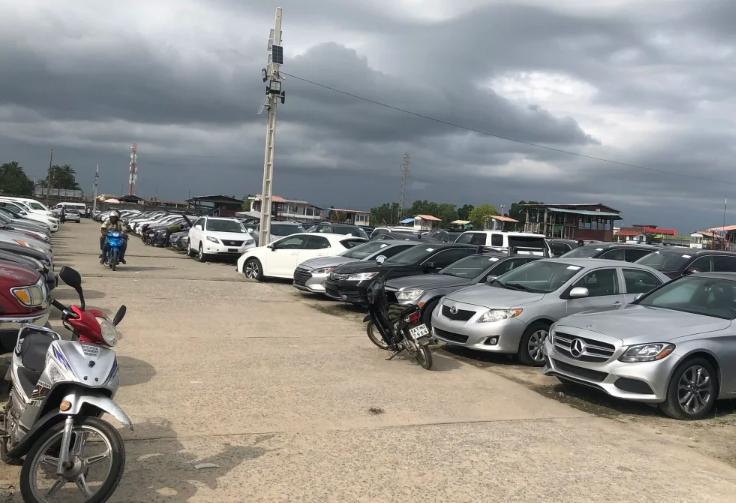In the busy car lot of Fifa Park, Rokeeb Yaya stands on the rocky ground, engaged in negotiations over the cost of a deep red car. The expansive lot is filled with hundreds of vehicles, arranged in rows that extend as far as the eye can see. Among them are some sleek and pristine, while others bear signs of wear and tear, with dents and a layer of dust.
Yaya is considering purchasing a 2008 Ford Escape, a US-made car, which is priced at approximately $4,000. Compared to other brands available in the lot, US cars tend to be more affordable. Yaya’s intention is to upgrade from his motorcycle to a car, and he is primarily focused on its affordability rather than its past.
However, the journey of this Ford Escape to its current location in one of Cotonou’s largest car lots reveals a larger narrative about the fate of many gas-guzzling cars from the Western countries, as they find new lives in West Africa. This particular Ford, at the age of 14, was shipped to Benin from the United States in the previous year, following its sale at an auto auction.
Upon reviewing car records, CNN has found that the Ford Escape had three previous owners in Virginia and Maryland. Throughout its journey, the vehicle has accumulated over 252,000 miles on the road. Although it experienced a previous recall related to its power steering, unlike many other cars in the lot, it arrived in relatively good condition, without any reported accidents.
The Ford Escape, an aging SUV, is just a single example among the millions of used cars that make their way to West Africa annually from affluent nations like Japan, South Korea, European countries, and the United States. A significant portion of these vehicles finds their destination in Benin, which stands as one of Africa’s leading importers of pre-owned vehicles.

With the West’s transition towards electric vehicles, the influx of used cars to West African ports is predicted to grow. While affluent nations are pursuing ambitious targets to encourage consumers to adopt electric vehicles and reduce greenhouse gas emissions, it doesn’t imply that gas-powered cars will disappear entirely.
Instead, a significant number of these vehicles will be transported over long distances to developing nations like Benin, where both populations and the demand for used cars are rapidly increasing.
According to experts, this practice will result in shifting climate and environmental issues to the most vulnerable countries in the face of the climate crisis, thereby undermining their efforts to reduce pollution that contributes to global warming.
Exploding demand
Between 2015 and 2019, the global market for used light-duty vehicles saw a substantial growth of almost 20%, with over 4.8 million vehicles being exported. Although there was a slight decrease in exports in 2020 due to the emergence of the Covid pandemic, the numbers are now swiftly rebounding, as highlighted by Rob de Jong, a representative from the United Nations Environment Programme, in a CNN interview.
According to data from UNEP, approximately 18% of the world’s used vehicles are exported by the United States. These vehicles are shipped to various destinations worldwide, including the Middle East and Central America, with a significant portion finding their way to Nigeria, Benin, and Ghana.
Among these exported vehicles, there are those classified as salvaged cars, which have been involved in accidents, subjected to flooding, or deemed too old to be sold as a whole. These salvaged cars are often auctioned off for parts. Additionally, there are complete used cars that American car dealers are seeking to sell off and export.

Dmitriy Shibarshin, the marketing director of West Coast Shipping, a company specializing in international car shipping, explained that many of the exported vehicles are two to five-year-old sedans from Hyundai and Toyota. These predominantly consist of economy cars that are shipped to various destinations.
According to Shibarshin, his company and similar ones act as the equivalent of FedEx for cars. While his company primarily focuses on shipping higher-end vehicles, they also handle the transportation of more affordable cars. In countries like Kenya and Nigeria, over 90% of the cars and trucks on the road are imported used vehicles. De Jong, who is based in Kenya, noted that the vehicle fleet in the country has been doubling every eight years. Consequently, streets that were once devoid of cars are now congested with traffic.
The demand for these used vehicles is incredibly high.
“You have a young population that is becoming wealthier day by day,” stated Etop Ipke, the CEO of Autochek Africa, an online car marketplace. “As they gain the means, their first priority is to have some form of mobility,” he added.
However, unlike in the US, access to credit is limited for many potential buyers, making new cars unattainable for them.
“That is essentially the main reason why we struggle to enhance the quality of cars being sold,” stated Ipke. “It’s not that people prefer to drive used cars; it’s a matter of affordability.”
Experts predict that the demand for used cars could further skyrocket as the adoption of electric cars increases in the Western countries, leading to a surplus of used cars available to African nations. According to the International Energy Agency, nearly one in five vehicles sold worldwide this year will be electric, compared to less than 5% in 2020. China, Europe, and the US are at the forefront of the electric vehicle market, as stated by the agency.
According to Matt Trapp, a regional vice president at the major auto auction company Manheim, in states like New York and Florida, where consumers are increasingly purchasing electric vehicles (EVs), dealers are exploring international markets as a potential outlet for selling their older gas-powered models.
The presence of strong port operations in those states makes them well-suited for shipping used cars to Africa, creating a mutually beneficial relationship.
“It’s an unsurprising development to witness the growing strength of the export market,” Trapp commented. “We can expect to see this trend continue to grow. When auto dealers identify demand in other markets, they will find ways to meet that demand and ship the vehicles accordingly.”
According to De Jong from UNEP, not all gas-powered cars raise concerns. It is primarily the older vehicles that pose a higher risk of pollution and safety issues. There is evidence indicating that the growing demand for vehicles in Africa has led to an increase in the shipment of old and salvaged cars to the continent, surpassing the numbers from two decades ago.
De Jong highlighted that there is currently a notable trend of exporting a diverse range of used vehicles from the global north to the global south. This trend not only involves an increase in the quantity of exported vehicles but also a decrease in their overall quality.
“Polluting or unsafe”
In a particular area of Fifa Park, CNN discovers a weathered 16-year-old Dodge Charger.
“The vehicle was just sold for 3 million XOF [approximately $4,500],” mentioned the seller, who preferred to remain anonymous.
The Dodge Charger had been imported from the US to Benin two years ago.
Across from the Charger sits a Ford Windstar, aged 24, which arrived in Benin from the US just last year. This older model provides an affordable option for budget-conscious car buyers who cannot afford newer vehicles. According to car dealer Abdul Koura, US and Canadian cars are highly sought after by importers, who frequently bring in vehicles that have been involved in accidents.

“Importers repair these cars and sell them at a profit,” Koura explained, showcasing his collection of over 30 used vehicles imported from Canada at Cotonou’s Fifa Park. According to Nigerian car dealer Victor Ojoh, who regularly visits Fifa Park, it’s often possible to discern the origin of a car based on the issues it has. Ojoh noted:
“The smoking cars are primarily from the US, while the cars from Canada often have electrical faults due to being flooded.”
It’s not uncommon for imported vehicles to be lacking catalytic converters, which are crucial for filtering toxic gases in the exhaust. These converters contain valuable metals like platinum and can be sold for up to $100 on the black market. According to Ojoh, some cars are shipped without catalytic converters, while others have them removed by dealers upon arrival.
According to UNEP, a significant number of cars exported to Africa and Asia from the US, Europe, and Japan are considered “polluting or unsafe.” These vehicles often have faulty or missing components, leading to the emission of toxic fumes that contribute to air pollution and impede climate change mitigation efforts. Regulations regarding pollution and safety standards for imported cars in West Africa have historically been lax. However, there have been recent efforts to strengthen these regulations and improve the overall quality of imported vehicles.
In 2020, Benin and 14 other members of the Economic Community of West African States (ECOWAS) implemented a series of vehicle emissions regulations. These regulations include an age restriction of 10 years for used vehicles and limits on carbon emissions from cars. However, the enforcement of these regulations remains unclear, and it is uncertain how strictly they are being implemented.
Discussions between UNEP officials, such as de Jong, and officials from the US and EU have taken place regarding the implementation of new regulations to address the shipment of extremely old or junk cars to developing nations. However, these discussions are still in the early stages and no commitments have been made yet. Nevertheless, de Jong emphasized that the issue of used cars has become a different matter due to climate change and global emissions. The increased transportation of older and more polluting vehicles poses a problem not only for developing countries where they are driven but also for developed nations. The environmental impact is a concern that affects all parties involved.

According to de Jong, the impact of emissions has a global reach, regardless of whether they originate in Washington, DC, or Lagos. The location of emissions is irrelevant in the face of climate change. Ipke, on the other hand, believes that it is not inevitable for Africa to accept all the old gas-powered cars discarded by the West. He remains hopeful that the transition to electric vehicles can also take place in Africa, although it would necessitate substantial advancements in charging infrastructure to support such a shift.
Ipke believes that Africa’s transition should not be limited to moving from used cars to new combustion engines, but rather from used cars to electric vehicles (EVs). He emphasizes the importance of Africa preparing for EVs, whether they are used or brand new, as it aligns with the global trend. However, for Yaya, such a transition appears distant. His visit to Fifa Park and interest in the old Ford SUV stemmed from a lack of alternative choices. He acknowledges that he can only purchase what he can afford with his current financial means.

